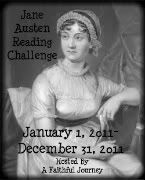I haven't read many mysteries...but this one has to be my hands-down favourite.
Set in England, I could truly picture the happenings. Flavia de Luce is the cheeky, chemistry-loving deducer of the identity of the murderer of the man she found dying, and then dead, in the garden of her family's estate. Doesn't take long to fall under her spell. A reader's delight. You won't want to put it down if you pick it up! I dare you!
One of my favourite quotes from this book:
'I detected instantly that she didn't like me. It's a fact of
life that a girl can tell in a flash if another girl likes her. Feely says that there is a broken telephone connection between men and women, and we can never know which of us rang off. With a boy you never know whether he's smitten or gagging, but with a girl you can tell in the first three seconds. Between girls there is a silent and unending flow of invisible signals, like the high-frequency wireless messages between the shore and the ships at sea, and this secret flow of dots and dashes was signaling that Mary detested me.'
Another:
'What kind of poison could work that quickly? I ran through the most likely possibilities. Cyanide worked in minutes: after turning blue in the face, the victime was asphyxiated almots immediately. It left behind a smell of bitter almonds But no, the case against cyanide was that, had it been used, the victime would have been dead before I found him. (Although I have to admit that I have a soft spot for cyanide-when it comes to speek, it is right up there with the best of them. If poisons were ponies, I'd put my money on cyanide.)'
This book is followed up by "The Weed that Strings the Hangman's Bag."
The third book in the series has been eagerly awaited and was set to make its debut on 8 February 2011: "A Red Herring Without Mustard: A Flavia de Luce Mystery."
It will be one of the next ebooks I purchase.


























![The Time Traveler's Wife [Blu-ray]](http://ws.amazon.com/widgets/q?MarketPlace=US&ServiceVersion=20070822&ID=AsinImage&WS=1&Format=_SL160_&ASIN=B001HN69CC&tag=notimre-20)



